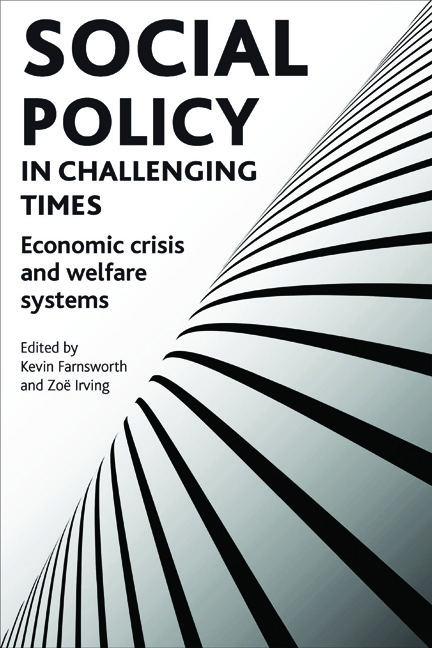Book contents
- Frontmatter
- Contents
- List of figures and tables
- Notes on contributors
- Acknowledgements
- one Varieties of crisis
- two The economic crisis and paradigm change
- three From financial crisis to fiscal crisis
- four Credit crunch, inequality and social policy
- five Global social policy responses to the economic crisis
- six Poverty, the crisis and social policy responses developing countries in developing countries
- seven South Korea after the 1997 economic crisis: a ‘paradigm shift’?
- eight China's response to crisis: what role for social policy?
- nine Tiptoeing through crisis? Re-evaluating the German social model in light of the global recession
- ten Ireland and the impact of the economic crisis: upholding the dominant policy paradigm
- eleven Waving not drowning: Iceland, kreppan and alternative social policy futures
- twelve Experiences from two financial crises in the Nordic welfare states: 1990-93 and 2008-10 compared
- thirteen Social policy and the recent economic crisis in Canada and the United States
- fourteen From economic crisis to a new age of austerity: the UK
- fifteen Responding to the challenges: some concluding remarks on welfare futures in changed circumstances
- Bibliography
- Index
nine - Tiptoeing through crisis? Re-evaluating the German social model in light of the global recession
Published online by Cambridge University Press: 07 September 2022
- Frontmatter
- Contents
- List of figures and tables
- Notes on contributors
- Acknowledgements
- one Varieties of crisis
- two The economic crisis and paradigm change
- three From financial crisis to fiscal crisis
- four Credit crunch, inequality and social policy
- five Global social policy responses to the economic crisis
- six Poverty, the crisis and social policy responses developing countries in developing countries
- seven South Korea after the 1997 economic crisis: a ‘paradigm shift’?
- eight China's response to crisis: what role for social policy?
- nine Tiptoeing through crisis? Re-evaluating the German social model in light of the global recession
- ten Ireland and the impact of the economic crisis: upholding the dominant policy paradigm
- eleven Waving not drowning: Iceland, kreppan and alternative social policy futures
- twelve Experiences from two financial crises in the Nordic welfare states: 1990-93 and 2008-10 compared
- thirteen Social policy and the recent economic crisis in Canada and the United States
- fourteen From economic crisis to a new age of austerity: the UK
- fifteen Responding to the challenges: some concluding remarks on welfare futures in changed circumstances
- Bibliography
- Index
Summary
Introduction: the rise and fall (and rise again?) of the German model
To contextualise the German case, it is tempting to draw comparisons with the United Kingdom (UK) as perceptions of these two economic powerhouses of Europe have been locked into something of a Yin and Yang relationship in recent decades. This is particularly so when Germany is viewed through the lens of British political debate.
In the early to mid-1990s, it was a commonly held view that the UK had much to learn from the German ‘model’. Indeed, in his bestselling The State We’re In, Hutton (1995) argued that there were fundamental weaknesses in the British economy – too focused on short-term profits and too heavily driven by the interests of the City – and held up Germany as the key example of a successful alternative. The book’s publication coincided with Tony Blair's election as Labour Party Leader and, as Driver and Martell (1998, p 46) note, ‘the early days of New Labour saw many look to European, more particularly German, capitalism as offering an attractive model’. Most notably, the idea of the UK adopting some elements of the ‘Rhineland model’ (Hutton, 1995) as part of a move towards ‘stakeholder capitalism’ briefly caught the imagination of Blair (see Kelly et al, 1997) before New Labour settled on an Anglo-Saxon model inspired by the approach of centre-left governments in Australia and America (Driver and Martell, 1998, p 46).
Once Blair was in power, however, far from Germany being a model for the UK to follow, the roles and reputations of their economies seemed to progressively reverse as the UK's performance outstripped Germany’s. With the dot.com boom symbolically marking the emergence a seemingly lucrative new knowledge-based economy, and increased global competition in the industrial sphere creating a challenging environment for European manufacturing, by the turn of the millennium Germany seemed to look old fashioned and out of shape, while the UK seemed the exemplar of a modern, flexible, knowledge economy. Indeed, when Gerhard Schröder became German Chancellor in late 1998, he looked towards Blair for ideas on modernising the German model. The two leaders (Blair and Schröder, 1999) published a joint manifesto for renewing European social democracy that drew heavily on Blair's ‘Third Way’ approach (Blair, 1998; Giddens, 1998).
- Type
- Chapter
- Information
- Social Policy in Challenging TimesEconomic Crisis and Welfare Systems, pp. 159 - 180Publisher: Bristol University PressPrint publication year: 2011
- 1
- Cited by

